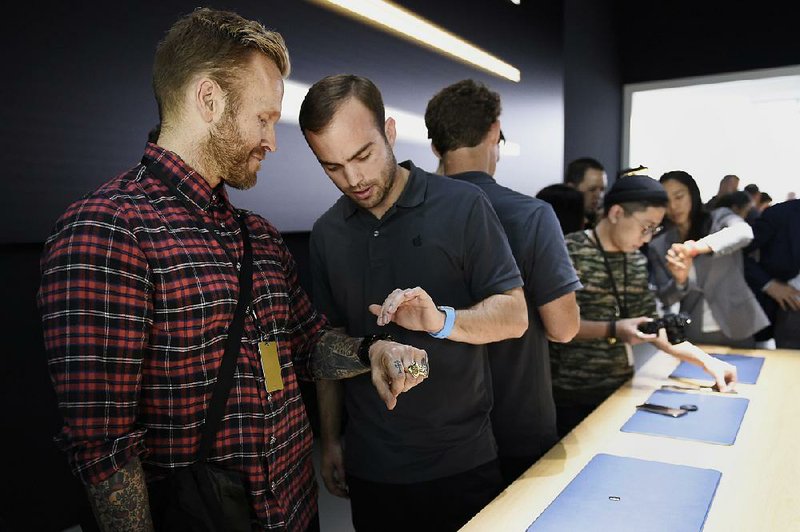Apple Inc. may soon sell as many timepieces as all of Switzerland, threatening the country's four-century- old industry, the co-inventor of the Swatch predicted.
The Apple Watch may reach sales of 20 million to 30 million units annually in the first few years, Elmar Mock said by phone last week. Switzerland exported 28.6 million watches in 2014. The Apple Watch will be available next month starting at $349 for a Sport model, $549 for a midrange version, and $10,000 for the high-end Apple Watch Edition.
"Apple will succeed quickly," said the 61-year-old, who helped create the low-price Swatch in the 1980s. "It will put a lot of pressure on the traditional watch industry and jobs in Switzerland."
Apple is set to challenge Switzerland's $38 billion watch industry after the Cupertino, Calif.-based company shook up markets such as music by driving consumers from CDs to iTunes and eroded Nokia Oyj's dominance by redefining the mobile phone. While some Swiss brands such as Tissot, TAG Heuer and Montblanc are dipping their toes in the smartwatch market, the industry as a whole has been underestimating the threat, Mock said.
Switzerland produces more than half of the world's watches in value even though it only makes a fraction of the timepieces in quantity, according to Rene Weber, an analyst at Bank Vontobel AG. Apple probably aims to achieve a similar position, according to Mock, who works at Creaholic, a consultancy he formed in 1986.
While "Swiss Made" has become a gauge of quality, the country's watch industry isn't impervious to threats -- 60,000 jobs disappeared in the 1970s and 1980s when Swiss watchmakers underestimated demand for more exact battery-powered quartz watches from Japanese producers such as Seiko. The success of the Swatch, a mass-market plastic watch that kept factories running, helped the industry revive.
"Unfortunately, I'm reminded too strongly of the quartz crisis," Mock said. "So far I see watchmakers in this country making the same mistakes as back then. We've seen a lot of arrogance in the Swiss watch industry in the past few years, calling the smartwatch a gadget and not taking it seriously."
To be sure, Mock said the competition will affect lower-end and mid-range watches the most. High-end brands will suffer in the short term, but only in entry-level offerings, he forecast.
"Similar to a luxury car, high-end watches are purchased as a visible reflection of wealth," said Deborah Aitken, an analyst at Bloomberg Intelligence. "The digital revolution has done little thus far to muffle mechanical luxury demand."
In the worst-case scenario, the Apple Watch's introduction would reduce annual revenue of Swatch Group AG, the largest Swiss watchmaker, by 6 percent, analysts at Barclays said in a note to investors. The company's 18 brands run the gamut of price levels, including Breguet and Blancpain, which sell watches for more than $100,000.
"There is no question that there could be risk of some degree of cannibalization of the high-end traditional watch- making industry, but there is probably equal opportunity for these players to both replicate and more likely partner with the smartwatch players," Sebastian DiGrande, who heads the West Coast technology, media and telecom practice for The Boston Consulting Group, wrote in an e-mail.
While top producers such as Rolex and Patek Philippe haven't announced any smartwatch plans, three publicly traded companies that make Swiss watches are preparing such devices.
Swatch Group, which also makes Omega and Tissot, has said it will unveil a smartwatch this year. The device will communicate via a form of technology known as NFC and be enabled to make mobile payments, Chief Executive Officer Nick Hayek said in a February interview.
TAG Heuer, a Swiss brand owned by French luxury-goods maker LVMH Moet Hennessy Louis Vuitton SA, is set to come out with a smartwatch featuring GPS and health monitoring functions before the end of the year. However, it won't have the Swiss-made label on it because the timepiece maker needs partners outside of Switzerland to help produce the technology, according to Jean- Claude Biver, head of LVMH's watch unit.
"I wouldn't call the Apple Watch a threat for the industry," he said last week by e-mail. The Apple Watch may lead more young people to wear watches, and eventually they'll be more likely to buy mechanical ones, he said. "Considering that Switzerland does not own the same industrial technology and facilities as Silicon Valley or giants like Samsung, Sony and LG, I believe that the Swiss reaction shows huge dynamism and speed."
SundayMonday Business on 03/15/2015

